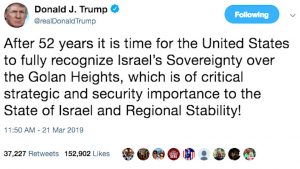United States President Donald Trump announced on Twitter last Thursday his decision to recognize Israeli sovereignty over the Golan Heights.
The tweet sent a sudden thrill through Israeli society just a couple weeks ahead of the April 9 Knesset elections. Prime Minister Binyamin Netanyahu (Likud), currently fighting for political survival, immediately welcomed the announcement, as did his opponents who experienced an obvious sense of political paralysis in the wake of the news.  The fact that Trump’s tweet so excited the Israeli electorate reveals a deep illness in a society that requires imperialist validation for its national interests. With or without American approval, the Golan belongs to the people of Israel. All we should ask is that Washington refrain from attempting to undermine our sovereignty.
The fact that Trump’s tweet so excited the Israeli electorate reveals a deep illness in a society that requires imperialist validation for its national interests. With or without American approval, the Golan belongs to the people of Israel. All we should ask is that Washington refrain from attempting to undermine our sovereignty.
Part of the tribal territory of Menashe in ancient Israel, the Golan was home to many Zealot guerrilla sects during the Roman occupation of the country. Gamla, one of the major population centers of the Golan during that period, was the site of an epic Jewish-Roman battle in the year 68. The town is also said to be the community from where Rabbi Yehuda HaGlili – founder of the revolutionary 4th Philosophy – originally hailed.
When the imperialist powers divided up the Semitic region into colonialist mandates following the first World War, the Golan was included in the French mandate for Syria rather than the British mandate for Palestine. When the French mandate ended in 1944, the Golan became part of the new state of Syria and remained outside the territory later liberated by Jewish underground fighters from British rule in 1948.
But on the final day of the 1967 Six Day War – after having already defeated Egypt and Jordan – Israel took back the Golan Heights from Syria. The US and its allies had already been pushing for a ceasefire, even threatening Jerusalem with severe sanctions. Prime Minister Levi Eshkol was ready to succumb to the pressure until Israelis of the eastern Galilee – who had lived under Syrian bombardment for almost 20 years – rushed to Jerusalem and successfully convinced Eshkol’s government to ignore international pressure and take the Golan.
Prime Minister Menaḥem Begin annexed the Golan in 1981, despite fierce opposition from the international community. Unlike Palestinians in the West Bank, the non-Jewish population living on the Golan do not experience an oppressive military rule. Despite occasional protestations in order to keep their relatives on the other side of the Syrian border safe, the Golan Druze community lives in dignity and equality with full Israeli citizenship, making it more difficult for Western diplomats to demand an Israeli retreat on moral grounds.
Until recently, Washington’s long-standing policy of pressing Israel to withdraw from the Golan Heights was largely driven by the interests of American oil companies. But due to years of civil war and instability in Syria, those interests have shifted.
It had been reported by the Financial Times in February 2013 that Israel’s Netanyahu-led government granted an American company the first license to explore for oil and gas on the Golan Heights.
A local subsidiary of the New York-listed Genie Energy company was given exclusive rights to a 153-square mile radius in the southern part of the Golan Heights. Genie Energy is advised by former Vice President Dick Cheney and its shareholders include Cheney, media mogul Rupert Murdoch and former CIA director James Woolsey.
“This action is mostly political – it’s an attempt to deepen Israeli commitment to the occupied Golan Heights,” late political analyst Yaron Ezraḥi told FT at the time.
“The timing is directly related to the fact that the Syrian government is dealing with violence and chaos and is not free to deal with this problem.”
American oil companies and their lobbyists had for decades believed their interests to be better served by a Syrian-ruled Golan Heights. But the last few years of bloody conflict in Syria, along with a hostile Russian presence on the ground, has given Netanyahu an opportunity to court the oil companies and offer the necessary incentives to secure what appears to be a major diplomatic victory just before elections.
While it can be argued that Netanyahu masterfully identified the material interests driving imperialist American policies in order to shift those interests towards policies that line up with Israeli national interests, the price for all this would of course be that any oil found on the Golan would largely benefit Genie Energy rather than the Israeli people to whom it actually belongs.





